The Messianic Peshitta Megilah for Purim
The Messianic Peshitta Megilah for Purim is an exceptional book for celebrating Purim. It is an abridgment of the Book of Esther, the only book in the Scriptures that does not mention G-d directly, either by name or title.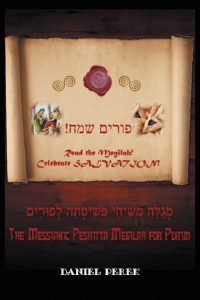
This abridged Megilah offers the Messianic community the opportunity to celebrate and learn more about Purim, as well as the Book of Esther.
Each chapter starts with a significant and direct quote from the Hebrew and the English. The rest of the corresponding biblical chapter is summarized for brevity and clarity. After each summarized chapter there are “Thoughts to Consider,” with probing analysis and questions about the chapter focused on the Messianic overtones of the book. These can be discussed during the Shpiel.
There are also suggestions for celebrating the Purim Shpiel, a comedic presentation of the Book of Esther. The book starts with the blessings for reading the Megilah, and ends with a glossary to define transliterated terms that may not be familiar. These transliterations render the more Jewish tone of the work, and aid in understanding Esther on a deeper level.
Everyone who uses this Megilah will gain better insight into the plan of Salvation, and learn how detailed and “present” G-d is in our lives, even when we do not see or hear Him.
Messianic Peshitta Haggadah for Pesakh
The Messianic Peshitta Haggadah for Pesakh is a truly unique Haggadah. It gives users a perspective on Pesakh that is as close as possible to the first-century Seder that Yeshua conducted with his Talmidim, especially the third cup, the “Cup of Redemption” in Judaism, the “Cup After Supper” that Yeshua blessed.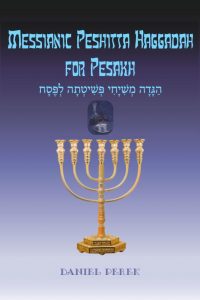
Readers are provided Hebrew and English citations from scripture to enjoy, along with transliterations of traditional blessings.
The fifteen steps of the Seder are detailed and explained without being too lengthy. There are explanations of Yeshua’s fulfillment of each step of the Seder, and revelations about Jewish customs that point to Yeshua as the Messiah, even ones developed long after Yeshua rose from the dead.
The scriptures cited are from “HaDavar, The Word of יהוה “ [ D’var יהוה ], a translation of the Masoretic Hebrew Tanakh and the Aramaic Peshitta Brit Khadashah.
There is also a glossary of terms, lyrics to traditional Pesakh tunes, and more. A Seder conducted with this Haggadah is sure to be blessed! Jews and Gentiles alike have come to salvation as a result!
רבדההוהי רבד HaDavar (The Word of הוהי): The Tanakh and Brit Khadashah Scriptures Volume I
Volume I
HaDavar, D’var יהוה, or “The Word of Yah,” is a new translation of the scriptures.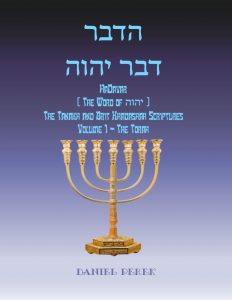
The source text for the Tanak, or “Old Testament,” is the Masoretic Hebrew. The source text for the Brit Khadashah is the Aramaic Peshitta texts of the New Testament.
This four-volume set contains the Hebrew version of the Tanak from the Masoretic text, and a new English translation of those texts, with transliterations for Hebrew terms in an English-friendly tone.
The author’s purpose is to give a more accurate, Hebrew/Jewish rendering of the texts, without giving up the beauty of Scripture for the English reader.
Volume 4, The Brit Khadashah, is coming soon.
רבדההוהי רבד HaDavar : The Tanakh and Brit Khadashah Scriptures Volume 2 — The Prophets
Volume II
HaDavar, D’var יהוה, or “The Word of Yah,” is a new translation of the scriptures.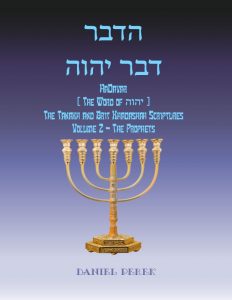
The source text for the Tanak, or “Old Testament,” is the Masoretic Hebrew. The source text for the Brit Khadashah is the Aramaic Peshitta texts of the New Testament.
This four-volume set contains the Hebrew version of the Tanak from the Masoretic text, and a new English translation of those texts, with transliterations for Hebrew terms in an English-friendly tone.
The author’s purpose is to give a more accurate, Hebrew/Jewish rendering of the texts, without giving up the beauty of Scripture for the English reader.
Volume 4, The Brit Khadashah, is coming soon.
רבדההוהי רבד HaDavar (The Word of הוהי): The Tanakh and Brit Khadashah Scriptures Volume IV — Renewed Covenant
This book is a temporary Volume IV in a four-volume set on Messianic Judaism by scholar Daniel Perek. It is an English translation of the Aramaic Peshitta New Testament, and will soon be accompanied by a Hebrew translation of the same. 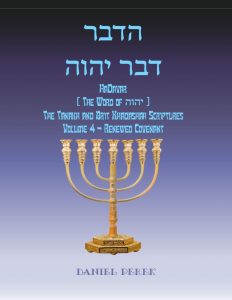
The goal of this New Testament is to put the Aramaic Peshitta text back into its cultural context as much as possible linguistically, by transliterating Hebrew names and other words, and looking more closely at the translation of certain words and concepts.
It is the author’s contention that the Aramaic texts preceded the Greek NT texts, and that this version will help readers see some of the reasons why. Namely, the use of the Name, יהוה , or מריא in the Aramaic, would not be so strategically used in an Aramaic translation from the Greek as it is in the Aramaic Peshitta texts, so one can easily see the Name as it was used by Yeshua and His Talmidim (Disciples).
Further, the Name “Yeshua,” ישוע, the given, human name of the Messiah, is affirmed as Yeshua in the Aramaic Peshitta texts, and is seen readily within this volume. The Hebrew translation will be completed shortly, offering the same and more to the Hebrew reader.
רבדההוהי רבד HaDavar (The Word of הוהי): The Tanakh and Brit … Volume III – The Writings (Hebrew Edition)
Volume III 
HaDavar, D’var יהוה, or “The Word of Yah,” is a new translation of the scriptures.
The source text for the Tanak, or “Old Testament,” is the Masoretic Hebrew. The source text for the Brit Khadashah is the Aramaic Peshitta texts of the New Testament.
This four-volume set contains the Hebrew version of the Tanak from the Masoretic text, and a new English translation of those texts, with transliterations for Hebrew terms in an English-friendly tone.
The author’s purpose is to give a more accurate, Hebrew/Jewish rendering of the texts, without giving up the beauty of Scripture for the English reader.
Volume 4, The Brit Khadashah, is coming soon.
Messianic Peshitta Siddur for Shabbat
Messianic Peshitta Siddur for Shabbat is truly a one-of-a-kind Siddur.
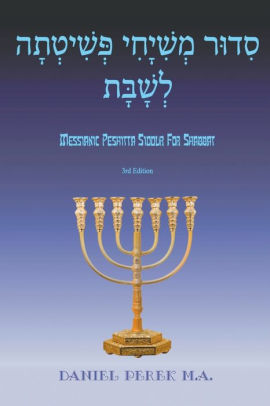
It features the ancient synagogue/temple rites, prayers, and psalms for worship in the synagogue, for Erev Shabbat in the home, for all High Holy Days, and for daily prayers, including the complete Tehillim/Psalms 1-150 in Hebrew and English.
Transliterations for all synagogue and daily prayers are included. The scriptures cited are from “HaDavar, The Word of יהוה,” a Hebrew and Aramaic Peshitta/English Bible. There is also a table of psalms for each Torah portion from the Parashot.
This Siddur is designed for both congregational and in-home worship, and will be invaluable for students of Biblical Hebrew.
“Prayer has always been an integral part of Biblical Jewish worship, even though the Torah itself does not explicitly command us to pray. The patriarchs all set the example of praying. According to Jewish tradition, Avraham is seen praying in the morning, Yitz’kḥak at noon, and Ya’akov at night … For all these reasons, and for many more, the Messianic Peshitta Community has adopted a lifestyle of prayer, and it should not cease while we are assembled!”
(About the Author)
Texas native Daniel Perek, M.A., is a trained Messianic rabbi and the founder of two Messianic synagogues in Texas. He is a freelance writer and investor who edited and translated this book from three languages. It is the third edition of the book. He states, “There is a need in the Messianic community for a Siddur that uses His Name, not blotting it out, and uses a Semitic Bible for translation into English, one that has full observance of all the High Holy Days.”